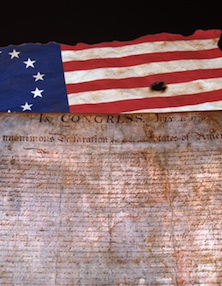By Derek Reinbold
On December 4, Phi Beta Kappa presented the 1776 Award to Senator Lamar Alexander of Tennessee and Representative Rush Holt of New Jersey. These two legislators’ contributions to education and higher learning were recognized at the launch of the National Arts and Sciences Initiative in Washington, D.C.
The son of a kindergarten teacher and an elementary school principal, Senator Alexander graduated Phi Beta Kappa with a B.A. from Vanderbilt University in 1962, and obtained a J.D. from New York University School of Law.
Since graduating, Alexander has served as the Governor of Tennessee, the Secretary of Education in the George H. W. Bush administration, and currently as the senior United States Senator from Tennessee.
Senator Alexander’s long career in public service has been marked by a steady commitment to education. In 1983, he implemented his “Better Schools” program, which standardized basic skills for all students and increased math, science, and computer education. The program drew national acclaim and eventually led to Alexander’s nomination as Secretary of Education.
While Secretary, Alexander traveled the country promoting President Bush’s “America 2000” efforts, raising provocative ideas like national standards and national testing. A constant focus was placed on public attitudes, calling on parents to lift the standards to which they hold their children. From the start, he demonstrated an appreciation of the local nature of schooling.
Education blogger Diane Ravitch worked for Secretary Alexander and had this to say of his tenure: “I developed great admiration for him as a thinker and leader. He understood the limits of federalism, and he was always careful not to use the power of the federal government to force states or localities to do what he or his party wanted.”
He also understands the role of education from the perspective of an educator. On receiving his award on December 4, Senator Alexander commented that “our country was founded by students of the liberal arts and sciences.” This comment is not surprising given that he has taught courses on the American character as a faculty member at Harvard’s Kennedy School of Government.
Currently, Senator Alexander serves as the Ranking Member on the Senate Health, Education, Labor, and Pensions (HELP) Committee. He wrote the Improving the Teaching and Learning of American History and Civics Act and has cosponsored legislation like the Empowering Local Education Decision Making Act to give local communities more autonomy to design their curricula.
Unlike Senator Alexander, Representative Holt was born into a political family. His father served as a United States Senator from West Virginia, and his mother was the first woman appointed to be West Virginia’s Secretary of State. In 1970, he graduated with a B.A. in physics from Carleton College. He later received M.A. and Ph.D. degrees in physics from New York University. He is currently one of two physicists serving in Congress.
From 1980 to 1988, Holt was a faculty member at Swarthmore College where he taught courses on physics, public policy, and religion. In 1998, he won election to the House of Representatives for the first time and has held his seat ever since, winning reelection in 2012 by a 40-point margin.
While in Congress, Representative Holt has been a vocal leader on educational issues. He has served as the Founder and Co-Chair of the Congressional Research and Development Caucus and as a member of the House Committee on Education and the Workforce. His website states that he “has worked to craft comprehensive education policies that improve early childhood education, invest in teacher training, set high standards for our students, and help make college more affordable.”
His legislative record backs these commitments. In 2006, Representative Holt helped write the College Cost Reduction Act to expand college aid and he later sponsored the “American Opportunity” tax credit to reduce the financial burden of higher education on low- and middle-income students.
In recognition of his efforts, Holt has received an “A” rating by the National Education Association and a 100 percent approval rating by the National Association for College Admission Counseling.
The 1776 Award recipients have demonstrated a deep commitment to higher education, to the broadening of academic opportunity for the less wealthy, and for high standards in the classroom. Both were educators themselves, so they appreciate the role of arts and sciences in providing a solid foundation for future generations of students. Though they approach these issues with different guiding philosophies, their dedication to education represents the work of a lifetime.
In presenting Senator Lamar Alexander and Representative Rush Holt with the inaugural 1776 Award, Phi Beta Kappa recognized their legislative leadership in advancing the arts and sciences.
Derek Reinbold is a senior at Case Western Reserve University, triple majoring in political science, international studies, and art history. Case Western is home to the Alpha of Ohio Chapter of Phi Beta Kappa.




